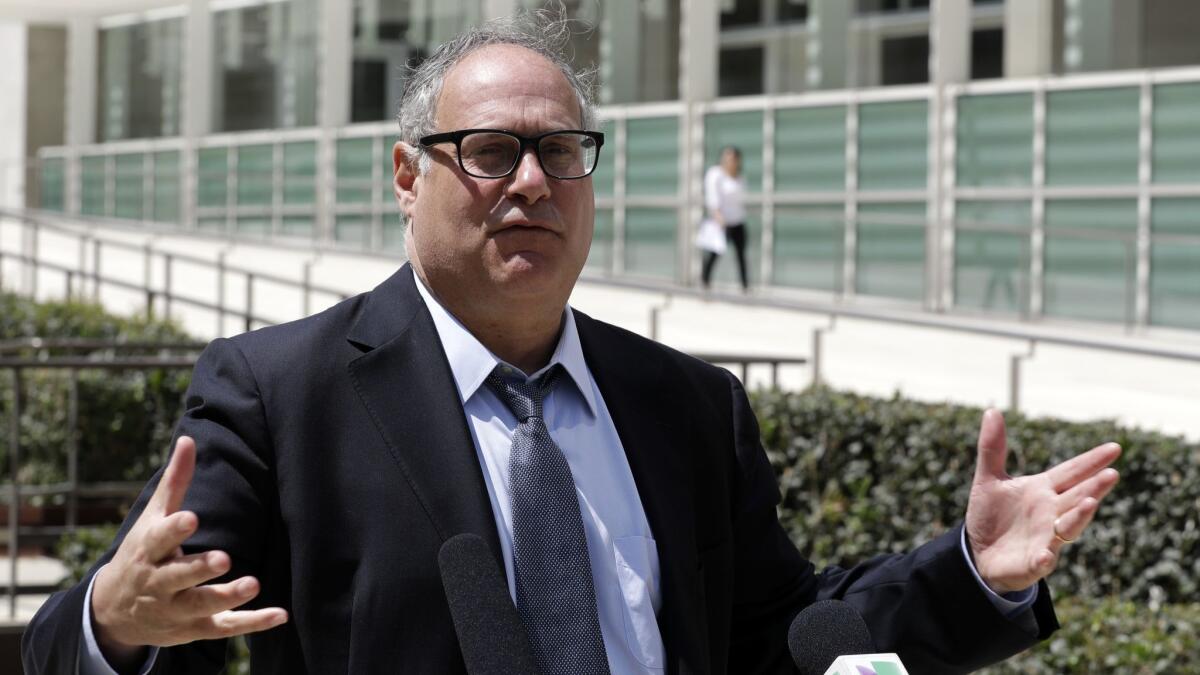U.S. government wants ACLU to find missing immigrant parents

- Share via
Reporting from San Diego — Government attorneys are asking that the American Civil Liberties Union take the lead in finding hundreds of parents who have not yet been reunited with their children, according to a court document filed Thursday.
The filing outlines potential next steps in the case after the government reunited about 1,800 immigrant families under court order. Immigration officials had separated the family members at the border, many under the “zero tolerance” policy introduced by Atty. Gen. Jeff Sessions that prosecuted people who crossed illegally.
The ACLU pushed back in its part of the filing, asking the judge in the class-action lawsuit to order the government to keep working on its own to locate parents and to provide more information to the civil rights organization so that it can assist in the reunification.
“The government must bear the ultimate burden of finding the parents,” the ACLU wrote in the filing. “Not only was it the government’s unconstitutional separation practice that led to this crisis, but the United States government has far more resources than any group of NGOs,” or nongovernmental organizations.
The government already returned children to parents whom it found eligible and who were still in immigration custody under an early July deadline for children under 5 and a late July deadline for older children. But those deadlines passed with more than 700 children remaining in federal custody.
On Monday, U.S. District Judge Dana Sabraw ordered both sides to submit proposals for finding parents who had already been deported or released into the U.S. It is likely that more than 450 parents were deported without their children and more than 200 were released into the U.S. while they wait for court hearings, according to government filings.
Under the ACLU’s plan, the government would keep looking for parents abroad and in the U.S. and would give the ACLU as much information as possible about where the parents might be. The ACLU called on the government to reunite families within seven days of identifying them.
The ACLU also asked the federal government to bring back parents who wanted to be reunited with their children in the U.S. rather than their home countries.
The government’s proposal would provide the ACLU with some, but not all, of the information the organization requested. Under the government’s plan, the ACLU would report to government attorneys every Monday about its progress in finding parents and would tell the government, after consulting with the parents, whether they wanted their children back.
The government reasoned that this system would allow the ACLU to provide legal advice to parents before they make their decisions, a step that the ACLU has said was not adequately handled in earlier reunifications.
Earlier this week, the ACLU argued that the government may have coerced parents into electing to be deported with their children instead of allowing their children to pursue asylum claims in the U.S.
In the latest filing, the ACLU also alleged that the government had possible contact information for some of the deported or released parents but had failed to act on it before the deadline. The ACLU argued that the court had only allowed the government to skip the July deadlines for deported or released parents because the government could not find them.
In other cases, the ACLU noted, the addresses that government attorneys gave the ACLU on Tuesday for 120 of these parents were incomplete or were the locations of immigration detention facilities in the U.S. Other addresses list the names of large cities with no street name or number.
The ACLU also said that the government had not provided all of the information ordered by Sabraw about parents who the government said were not eligible for reunification.
The filing previews a status hearing scheduled for Friday afternoon.
Sabraw has not yet ruled on a request from the ACLU to keep the government from deporting recently reunited families. A separate lawsuit was filed in Washington, D.C., last week over the issue.
The federal government hopes to combine the cases.
kate.morrissey@sduniontribune.com
Morrissey writes for the San Diego Union-Tribune.
More to Read
Sign up for Essential California
The most important California stories and recommendations in your inbox every morning.
You may occasionally receive promotional content from the Los Angeles Times.











